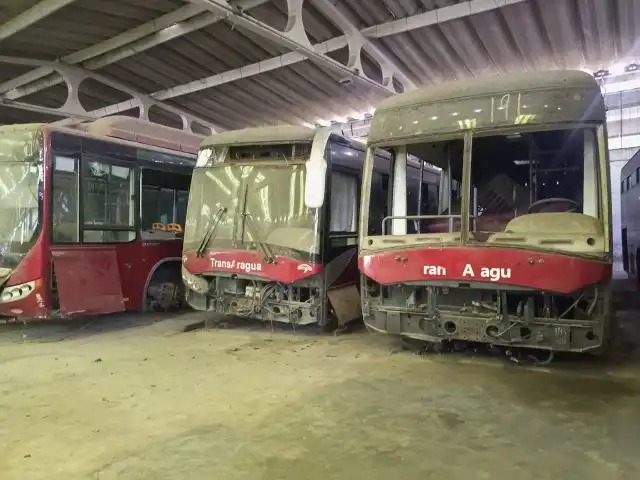
As a reflection the difficulties faced by the transport sector in the country, currently in Aragua State less than 30% of the existing transport units are operational to cover the urban and suburban routes of the 18 municipalities of the entity.
Correspondent lapatilla.com
This statistic was reported by José Luis Trocel, President of the United Transport Front (FUT) in Aragua, who pointed out that the main problem that hits Aragua public transport is the lack of fuel in the service stations destined for this sector.
“In Aragua there are five stations dedicated to public transport. The problem is not that there are five, ten or twenty, The problem is that fuel does not arrive at these stations in the quantity and regularity that we need to be able to work at 100%,” he commented.
Likewise, he insisted that the costs of spare parts and general maintenance of vehicles are very high.This represents another difficulty in offering an optimal service to citizens who depend on public transportation.
Futhermore, the drivers consider that a fair fare should be set between 12 and 15 bolivars, in order to be able to cover the maintenance of the units and generate profit for the drivers.
It is worse remedy than the disease
10 years have passed since Nicolás Maduro’s regime inaugurated the “TransAragua” and “TransMaracay” public transport system, a service that would have 125 units arranged in 7 routes to cover the central area of “The Garden City” and the adjacent suburban areas, such as Cagua, Palo Negro, Turmero and La Victoria.
At its historical peaks, according to figures provided by Hipólito Abreu, who was president of this transport system and current Minister of Industry and National Production, TransAragua mobilized 125,000 people daily, while currently it does not exceed 5,000 users.
Earlier this year, a group of workers denounced the ml administration and mismanagement of the outgoing president, Ángel Gutiérrez, who was removed from office by Governor Karina Carpio. The president appointed Miguel Antonio Pérez in that position, who under the “TransAragua resprouts” plan set out to recover the fleets and guarantee the well-being of the personnel.
A TransAragua worker, who preferred to remain anonymous, given the possibility that the new Chavista administration “passes him the bill” and fires him, assured that “not even the Covid generated as much destruction as this government”, recalling that after they began to operate these buses it was only possible to offer a quality service for one year.
“All the units were new, they had air conditioning, they were safe buses and people liked to use the TransAragua and TransMaracay. It was nice for us workers as well as for users. We all came out as winners, but as time went by and very quickly, everything fell apart,” he added.
In the latest statements by the current president of TransAragua, he admitted the corruption of Ángel Gutiérrez, because in his opinion the company “was mismanaged and beaten down.” He said so after receiving only 18 units, and reactivating four more days after he took over as head of the “most modern transportation system in Latin America and the Caribbean,” as Maduro said during the inauguration of TransMaracay.
Nevertheless, internally the workers see the changes or “improvements” with little hope, because the problem lies in the fact that the system is not self-sustaining because it depends on a subsidy that people receive in tickets and buses. In addition, these units require high-cost maintenance, since at the time each accordion-type (flex) bus was purchased for about $480,000.
Given this, Miguel Antonio Pérez pointed out that he will seek the means (budget) so that the workers are well. “The idea is to get closer and listen to each other. If they agree on the salary thing this will work better, it’s not just an operator or a mechanic. They are parents and they need us to support them,” statements that contrast with those of the outgoing president, who indicated in January that “due to the economic blockade and the war with the dollar” the recovery of the units was made uphill.
“We are a state company whose income is in bolivars, but which must buy spare parts in dollars. The salary of the workers is the one that is established in the official tabulators, and all the 258 workers of TransAragua have all the social demands, including those of health and food,” he added.
Deep red scrap
The workers denounced that both the main headquarters of TransAragua in Turmero, as well as the San Jacinto Terminal, have become scrapyards. “Indeed, they have dismantled some units to repair others, they even use burned oil. We disagree with this practice, as it further damages the vehicles.”
With the new management, the workers expect authorities to come clean. “We need the authorities to keep an eye on the company, because moreover, the few units that remain are used for excursions and private trips that are charged in foreign currency,” denounced another worker.
He explained that on weekends, trips constantly leave for Ocumare or Choroní. These cost up to 250 U.S. dollars. “There is a lot of corruption. Where does that money go? Because we operators barely get paid 20 dollars for those trips.”
It is worth noting that TransAragua was inaugurated in November 2013 to provide services on the following routes: San Jacinto – Cagua, San Jacinto – El Limón, San Jacinto – Tapa Tapa and San Jacinto – Palo Negro.
Later, the TransMaracay mass transit system was inaugurated in April 2015 by Nicolás Maduro, which operates along a road corridor on Constitución Avenue, in the city of Maracay, providing an exclusive service with articulated buses. The system has various stations and two terminals located in the Tapa Tapa and San Jacinto sectors.

